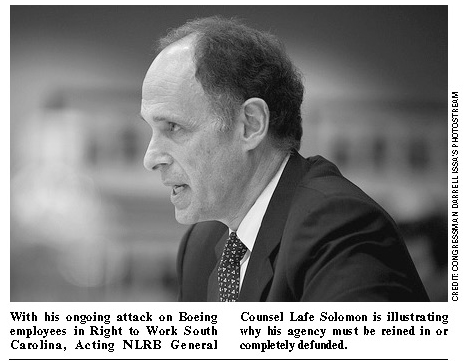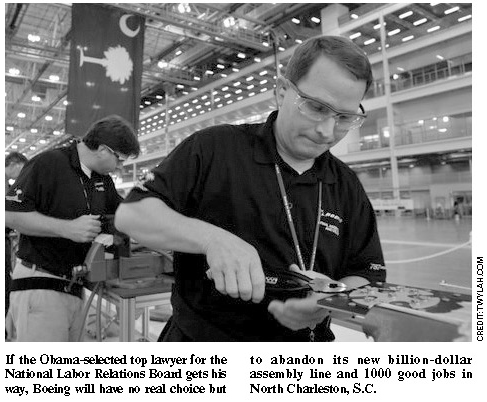Is This Any Way to Run a City’s Schools?
Leaked CTU Proposals Won’t Do Anything to Improve Schools’ Poor Performance
 New York Times Pundit: Reckless Obama NLRB ‘Paralyzing’ Economy
New York Times Pundit: Reckless Obama NLRB ‘Paralyzing’ Economy
(Source: September 2011 NRTWC Newsletter)
For years, New York Times commentator Joe Nocera has been one of the most relentless champions of government regulation of business and “stimulus” spending in the American media.
When even Mr. Nocera starts agreeing with critics of a presidential administration that it has gone “too far” in interfering with the decision-making of businesses and their employees, that administration clearly has a serious problem.
Therefore, Mr. Nocera’s August 23 Times column about the ongoing effort by Acting National Labor Relations Board (NLRB) General Counsel Lafe Solomon to dictate where businesses may or may not expand should have set off alarm bells at the White House.
Mr. Solomon’s immediate target is Boeing and its employees in Right to Work South Carolina. In April, he filed a complaint against the company, America’s biggest exporter of manufactured products, for initiating a new 787 Dreamliner assembly line in North Charleston.
As Mr. Nocera observed in his column bemoaning this Solomon power grab, “Boeing’s aircraft assembly has long been done by its unionized work force in Puget Sound, Wash.” Indeed, seven Dreaminers will still be assembled each month in Puget Sound.
“The South Carolina facility,” Mr. Nocera explained, “is a hedge against the possibility” that International Association of Machinists (IAM) union kingpins will order unionized employees in Puget Sound out on strike, and thus “shut down production of the Dreamliner.”
A ‘Mind-Boggling Stretch’ To Characterize Boeing’s Strategy as ‘Retaliation’
Boeing chose to add its North Charleston line, which will assemble three Dreamliners a month, only after trying assiduously, but unsuccessfully, to negotiate with IAM chieftains a “moratorium on strikes — precisely because it needed to get the airplane into the hands of impatient customers.”
For a company that had no other economically viable way of avoiding recurrences in the future of strikes that have cost its shareholders, employees and clients billions of dollars in the past, the South Carolina expansion was “a perfectly legitimate hedge” that it could make without fear of legal repercussions.
But this spring Mr. Solomon, the man whom President Obama unilaterally installed as acting NLRB general counsel in June 2010, declared that making such a hedge to avoid or at least mitigate multi-billion-dollar revenue losses stemming from disruptive IAM strikes constitutes illegal “retaliation.”
Even for a normally regulation-happy pundit like Mr. Nocera, it is a “mind-boggling stretch” to characterize Boeing’s strategy as “retaliation.”
And that is what the Times columnist finds “so jarring about this case — and not just for Boeing. Without any warning, the rules have changed. Uncertainty has replaced certainty. Other companies have to start wondering what other rules could soon change. It becomes a reason to hold back hiring.”
In short, the Obama NLRB’s aggressive rewriting of federal labor law to benefit the President’s political patrons in the union hierarchy is “paralyzing” job creation.
The Boeing case is currently before an NLRB administrative law judge and could drag on for years.
Right to Work Legislative Staffers Push For Effective Congressional Countermeasures
But National Right to Work Committee officers and members and other Americans concerned about the anti-employee, anti-business, and anti-economic growth impact of the Solomon complaint are fighting back.
“Working together with other citizen groups who share our position on this issue, the Committee aims to bring a halt to the NLRB attack on the 1000 Dreamliner assembly employees already at work in North Charleston and their employer before any more damage is done,” said Committee President Mark Mix.
“The Obama-selected acting general counsel’s action, which has apparent philosophical support from members of the Obama board itself, is outrageous. This action has deeply offended millions of Americans who otherwise hold disparate views about public policy.
“No wonder, then, that there is no shortage of politicians in Congress with ideas about how to derail the Boeing case — some better than others.
“One promising approach is to exercise Congress’s constitutional power over the NLRB budget. Committee legislative staff members are now working with Capitol Hill allies to secure legislative votes this fall on appropriations amendments cutting off funds for pursuit of the NLRB’s Boeing case.
“Better yet would be for Congress to vote to defund the NLRB completely. Back in February, the Committee supported an appropriations amendment by pro-Right to Work Congressman Tom Price [R-Ga.] that would have blocked all taxpayer funding for NLRB operations for the rest of Fiscal 2011.
“It’s bad enough that America’s federal labor laws are strongly biased against the individual employee’s Right to Work. Leaving enforcement of these laws in the hands of forced-unionism ideologues like Lafe Solomon, rather than less partisan Department of Justice attorneys, only makes matters worse.”
Mr. Mix continued: “And the fact is, the Boeing power grab is only one of an array of ways in which the Obama NLRB is now threatening to eviscerate employees’ Right to Work.”
Another ongoing attack on employees’ personal freedom is the “ambush” election proposal expected to be finalized by President Obama’s NLRB bureaucrats within a few weeks after this Right to Work Newsletter edition goes to press.
‘Ambush’ Elections Would Deny Workers a Meaningful Vote
Wilma Liebman, originally appointed to the NLRB by union-label President Bill Clinton and elevated to the NLRB chairmanship by Barack Obama in 2009, and two Obama-appointed board members, Craig Becker and Mark Pearce, officially announced the “ambush” election plan on June 22.
In practice, the proposed changes would eviscerate workers’ right under current law to make a collective choice against union monopoly bargaining in their workplace.
Under federally-authorized union monopoly bargaining, the bosses of a single union wield “exclusive” power to negotiate employees’ pay, benefits, and work rules. Employees who refuse to join the union are denied the freedom to bargain over their job conditions on their own behalf or through another union.
Currently, the NLRB allows an average of 38-40 days from the time an employer is notified that a union is seeking monopoly-bargaining privileges over his or her employees to the time the workplace election over unionization occurs.
Employers often use that relatively brief period of time to make the case to their employees that unionization isn’t in their best interest.
But the “ambush” election rules proposed by the Obama NLRB would shorten the time frame to 10-14 days, or perhaps even less.
Mr. Mix charged: “Effectively, employees would be denied the opportunity to hear both sides of the story before voting on unionization, because employers would be denied enough time to make their case.”
Employee Phone Numbers, E-Mail Addresses Would Be Handed Over to Union Organizers
In addition to denying business owners and managers any real chance to counter union organizers’ claims, the NLRB’s proposed new rules mandate that employee phone numbers and e-mail addresses be handed over to union organizers at the outset of each “ambush” election campaign.
The new rules would also make it even more difficult for independent-minded employees and businesses to challenge election misconduct by union bosses and their henchmen.
“Fortunately, the U.S. House, under the leadership of avowed Right to Work supporter John Boehner [R-Ohio], has the power to cut off funds for implementation of the NLRB ‘ambush’ election scheme as well as for prosecution of the Boeing complaint,” noted Mr. Mix.
“By refusing to vote for a Fiscal 2012 NLRB budget unless it curtails Obama bureaucrats’ worst excesses, the House can actually stop many board abuses without the cooperation of union-label Senate Majority Leader Harry Reid [D-Nev.] or the White House.
“But that will require intestinal fortitude on the part of Speaker Boehner and other House leaders, and ever-intensifying mobilization of Right to Work supporters nationwide.”

Leaked CTU Proposals Won’t Do Anything to Improve Schools’ Poor Performance

Wherever Big Labor wields the power to collect forced union dues, union bosses funnel a large share of the confiscated money into efforts to elect and reelect business-bashing politicians. Employment growth tends to lag as a consequence.

Members Insist They Keep Pro-Right to Work Campaign Promises